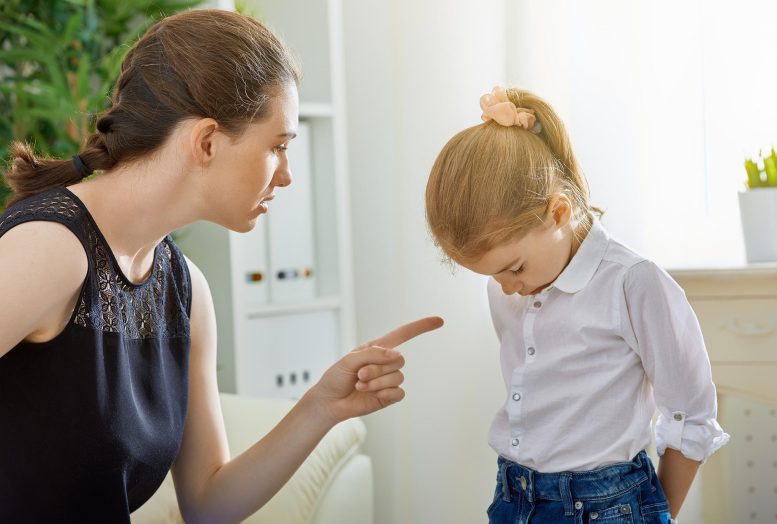
Child maltreatment currently encompasses four categories: physical, sexual, emotional abuse, and neglect. A study in Child Abuse & Neglect assessed definitions and measurements of child verbal abuse. The research highlighted the need for a consistent definition, as verbal abuse is sometimes seen as disciplinary in some cultures. Verbal abuse includes actions like belittling, shouting, and threats, leading to emotional and psychological harm. The study advocates for recognizing verbal abuse as a distinct subtype of maltreatment.
A new systematic review by researchers at UCL (University College London) and Wingate University has highlighted the importance of identifying childhood verbal abuse by adults as a standalone subtype of child maltreatment, to ensure targeted prevention and address the lasting harm it can inflict.
Child maltreatment is currently classified into four subtypes: physical abuse, sexual abuse, emotional abuse, and neglect. These classifications guide the creation of interventions and the monitoring of affected populations.
The study, published in Child Abuse & Neglect: The International Journal and commissioned by charity, Words Matter, examines a total of 149 quantitative and 17 qualitative studies to assess how child verbal abuse is currently defined and measured.
Researchers found that there needs to be a more consistent way of defining childhood verbal abuse, as it currently varies between parents and other authorities, with it being normalized in some cultures as a form of discipline.
Nature and Impact of Verbal Abuse
The nature of childhood verbal abuse involves behaviors that can be detrimental to a child’s well-being, such as belittling, shouting, and threatening language.
It was found that these actions could have a lasting impact throughout the child’s life, creating underlying emotional and psychological repercussions, including increased risks of anger, depression, substance abuse, self-harm, and obesity.
However, the team noted that there was a noticeable void in acknowledging childhood verbal abuse by adults as a distinct maltreatment subtype and that doing so would be a starting point for its identification and prevention.
Co-author, Professor Peter Fonagy (UCL Psychology & Language Sciences), said: “This systematic review is timely and of significant clinical value. Preventing the maltreatment of children is the most effective way we can reduce the prevalence of child mental health problems. A sharp focus on childhood verbal abuse by adults around them by the new charity Words Matter, and this review will help make significant change, and support and direct our efforts to identify and respond to this risk in an effective and timely manner.”
Global Data and the Need for Clear Definitions
Data from the World Health Organization (WHO) has found that emotional abuse is now the most prevalent form of child maltreatment, ahead of physical or sexual abuse.*
However, researchers found that the term “emotional abuse” was ambiguous and focused on the victim.
Whereas the term “childhood verbal abuse” zeroes in on the adult’s actions and this onus could be a starting point for prevention, were it to be made a subtype in its own right.
There was also a range of varying terminology associated with “verbal abuse” across the studies, with terms such as “verbal aggression,” “verbal hostility,” and “verbal abuse” being used — highlighting the need for standardized terminology in this area.
Perpetrators and Characteristics
The review found that the main perpetrators of childhood verbal abuse by adults were parents (76.5%), other adult caregivers in the home (2.4%), and teachers (12.71%). Other adults noted were coaches (0.6%) and police (0.6%).
Shouting and screaming were the most documented characteristics of verbal abuse. However, the research emphasizes that definitions of childhood verbal abuse should not only consider the words used but also the intent, delivery, and the immediate impact on children.
More research would need to be carried out on specific age groups to further understand the effects of this behavior.
Lead author, Professor Shanta Dube (Wingate University, US), said: “Childhood verbal abuse desperately needs to be acknowledged as an abuse subtype, because of the lifelong negative consequences.
“We’ve seen tremendous strides in increased awareness and interventions targeting physical and sexual abuse perpetrators leading to the reduction in these forms of maltreatment. If we focus on ‘verbal abuse’ by perpetrators rather than just ‘emotional abuse’ among victims, we may develop similar actions to prevent childhood verbal abuse and its consequences.
“Breaking the intergenerational cycles starts with the adults.”
Jessica Bondy, Founder of Words Matter, a newly established charity with the mission of enhancing children’s overall health and wellbeing by curtailing verbal abuse by adults in their lives, said: “It’s paramount to grasp the true scale and impact of childhood verbal abuse. All adults get overloaded sometimes and say things unintentionally. We have to work collectively to devise ways to recognize these actions and end childhood verbal abuse by adults so children can flourish.
“Words have weight, they can uplift or destroy. Let’s build children up, not knock them down.”
Reference: “Childhood verbal abuse as a child maltreatment subtype: A systematic review of the current evidence” by Shanta R. Dube, Elizabeth T. Li, Guilherme Fiorini, Caleb Lin, Nikita Singh, Kumayl Khamisa, Jennifer McGowan and Peter Fonagy, 14 August 2023, Child Abuse & Neglect.
DOI: 10.1016/j.chiabu.2023.106394









Sticks and stones..let see here…now they will be arresting parents for shouting….while teachers & doctors can “transition” them without parental consent…
Yup,we’re in the age of tyranny..
And this so called “science” website is attributing to it…
“Shouting at Kids Can Have Lifelong Impacts”
Yes. They become acutely aware that there are consequences to their actions.
If there are no repercussions for bad behavior, that behavior is strengthened and follows them into adulthood.
being shouted and sworn at does not teach kids about repercussions, it makes a kid run on their nerves ,destroys self esteem and confidence. it’s an ineffective way to communicate if you want to be heard and understood. a calm and firm explanation about what, why and how the behaviour is not o.k. followed by a relevant repercussion or action to make amends works wonders. I had a mum that shouted and swore and threatened and a dad who calmly explained, I heard, learnt and understood my dad , I am who I am because of all my dad calmly explained and instilled in me. I have anxiety and self doubt from my mum’s yelling and put downs…it damages you for life, I was lucky I had my dad and have his life skill set and wisdom instilled in me .
I would hope for another study to clarify who the perpetrators are. People with personality disorders are not just gonna yell, they’re gonna scare a kid when the parent can’t self regulate.
Ha! If only they had discovered this 60 odd years ago when I was a kid.
Unfortunately, people will procreate regardless of their inability to parent their children in a psychologically functional/healthy manner. Many people seem to perceive thus treat human procreative ‘rights’ as though they [people] will somehow, in blind anticipation, be innately inclined to sufficiently understand and appropriately nurture our children’s naturally developing minds and needs.
One wonders how much child abuse and long-term suffering might have been prevented had some crucial child-development science via mandatory high-school curriculum been taught. After all, dysfunctional and/or abusive parents, for example, may not have had the chance to be anything else due to their lack of such education and their own dysfunctional/abusive rearing as children.
Still, in the book Childhood Disrupted: How Your Biography Becomes Your Biology and How You Can Heal it’s written that “[even] well-meaning and loving parents can unintentionally do harm to a child if they are not well informed about human development” (pg.24).
Regarding early life or adverse childhood experience trauma, people tend to know (perhaps commonsensically) that they should not loudly quarrel when, for instance, a baby is in the next room; however, do they know about the intricacies of why not?
Since it cannot fight or flight, a baby stuck in a crib on its back hearing parental discord in the next room can only “move into a third neurological state, known as a ‘freeze’ state … This freeze state is a trauma state” (pg.123).
This causes its brain to improperly develop. It’s like a form of non-physical-impact brain damage.
Also, it is the unpredictability of a stressor, and not the intensity, that does the most harm. When the stressor “is completely predictable, even if it is more traumatic — such as giving a [laboratory] rat a regularly scheduled foot shock accompanied by a sharp, loud sound — the stress does not create these exact same [negative] brain changes” (pg.42).
Furthermore, how many of us were aware that, since young children completely rely on their parents for protection and sustenance, they will understandably stress over having their parents angry at them for prolonged periods of time? It makes me question the wisdom of punishing children by sending them to their room without dinner.
Yet, general society perceives and treats human procreative ‘rights’ as though we’ll somehow, in blind anticipation, be innately inclined to sufficiently understand and appropriately nurture our children’s naturally developing minds and needs.
This has got to be a joke, shouting is as damaging as sexual abuse?? Is this just an attempt to normalize pedophilia? While shouting is not the best parenting approach, it is nowhere close to sexual abuse. This is just plain dumb, definitely not paying for my kids to get a psychology degree. Who pays for this trash research?
This study of course, won’t go anywhere, because it is the very strength that makes America Great!!! And, hence of course, the UK, and all the other NATO nations of the world; rest assured that if these people ever dare speak word of this ever again, they will be dealt with severely; my siblings had my mother killed, just for this sort of behavior, and like how their mother couldn’t see anything wrong with her behavior, my siblings can’t see anything wrong with their behavior. This sort of behavior is probably a manifestation of a past toxoplasmosis infection that leaves a lasting psychological disorder in it’s wake; although the claim is that only 10% of the US population is affected by this parasite; one of the symptoms of this infection is that the infected individual would lie about it and the real infection rate would be 90%; corresponding to a real, corruption rate of 90%, rather than the reported 10%. Elsewhere in the world the claim is made that 90% of the of the populous is infected, but, you know, we are an exceptional people. I remember one man speaking of the wonder dinners that he had with his father that consisted mostly of talking about killing people, and I remember a child that I met when I was 8, who said that he wanted to be a cop when he grew up so that he could kill people; us Americans, we’re such great wonderful people; nothing wrong with us at all. Great report, but some people have known something of this nature for hundreds of years and have advocated for this sort of abuse just for its political and military usefulness, just because that’s the nature of both the cycle of abuse and the nature of this infection; and more like than not it will lead to the extinction of the human species.